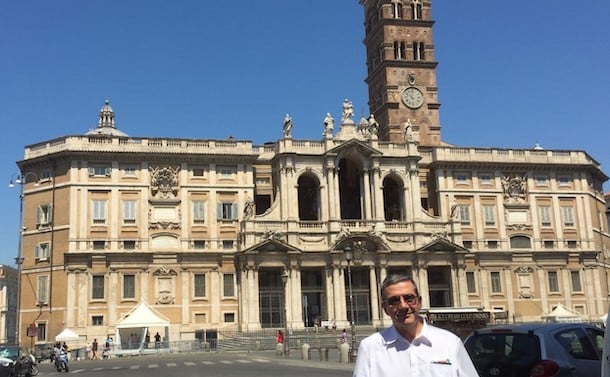Back in the Eternal City after three years, and there is another political scandal on the horizon. Or at least the local media machine (every bit as bad as its U.S. equivalent) would have us believe there was. The target: Matteo Salvini, Italy’s famously Euroskeptic interior minister. The accusation: corrupt dealings between his Lega party and some Russian businessmen. My verdict: a crude Intel attempt by the global Deep State Inc. to effect regime change.
What we have is a local rendering of the old story of “suspicious Moscow contacts,” “Russian money buying influence,” and of course the interlocutors’ suspected “Kremlin connections.” It all started when unlikely “journalists” (actually, https://www.buzzfeednews.com/ ) reported on an allegedly secret meeting at a Moscow hotel last October between three Italians–one of them close to Salvini–and three unidentified Russians. The story claims that they discussed an oil deal through which the League would receive indirect payments worth millions of dollars.
There is an inconclusive audio recording, an unrepentant Salvini, a hysterical media pack, and an overwhelmingly indifferent Italian public. This would-be affair is reminiscent of a strange episode earlier this year, when the head of Austria’s “far-right” Freedom Party, Heinz-Christian Strache, resigned as vice-chancellor after being caught on camera discussing a deal with a person he assumed was a Russian investor–but was in reality a Western intel operative. But this time it will not work, I am told by those in the know, because there is no smoking gun and no real story.
The real story is as follows. To the kleptocrats and gangsters who are used to running Italy, and who are dismayed that they have been out of power since June last year, Matteo Salvini is the enemy No. 1. He is guilty on five key counts: (1) he is an avid Euroskeptic sovereignist who abhors the Brussels machine; (2) he is a determined and effective opponent of the migratory deluge; (3) he is pro-family and declares, “God created man and woman, every child should have a father and a mother, and only they can conceive a child”; (4) he wants to get Italy out of the Eurozone, which he calls “a crime against humanity”; and (5) he favors improved relations with Russia, “the key player in any European arrangement.”
“They” hope to bring Salvini down, to use his downfall to resuscitate the moribund centrist-leftist opposition, and in the interim to install another “cabinet of experts” which would bring Italy back into the Brussels fold… and bring Italy’s peasants to heel.
In the short term nothing significant will happen. As for the medium term, even if the 5-Star Movement disintegrates and the coalition government collapses, the League is likely to be the main beneficiary. On current form it will gain over 40 percent of the vote in a general election, and may form a government all by itself.
The latest media-induced storm has not made the slightest difference to the mood of the public. Most Italians pay even less attention than Americans to the bien pensants’ predictable pontifications. “There will be no March on Rome Redux,” my hosts assure me. “Or there may be, but only in order to prevent the old guard’s return.”
THE CONTEXT–The Italian deep state is arguably deeper, older, and in some ways even more sinister than its American equivalent. Its birth is inseparable from the role of ferociously anticlerical Freemasons in the founding of the modern Italian state (1861-1871). Giuseppe Mazzini, the moving spirit of the Risorgimento, was a life-long master of the Brotherhood. During his brief rule in Rome in 1849–with Pope Pius IX in exile in Gaeta–Mazzini produced a turncoat churchman to bless the crowd on Easter Sunday from the balcony of St. Peter’s, and stood waving by his side during the grotesque proceedings. True to his core beliefs, Mazzini was also an early advocate of the United States of Europe, which he regarded as a necessary next step after the unification of Italy. Accordingly, in 1834 he co-founded the Young Europe movement.
Mazzini’s fellow 33rd-degree Mason Giuseppe Garibaldi fought to conquer southern Italy and Sicily for “Italy”; but he, too, regarded the new state not as an end in itself but as a stepping stone to a grander design. In 1867, Garibaldi,
